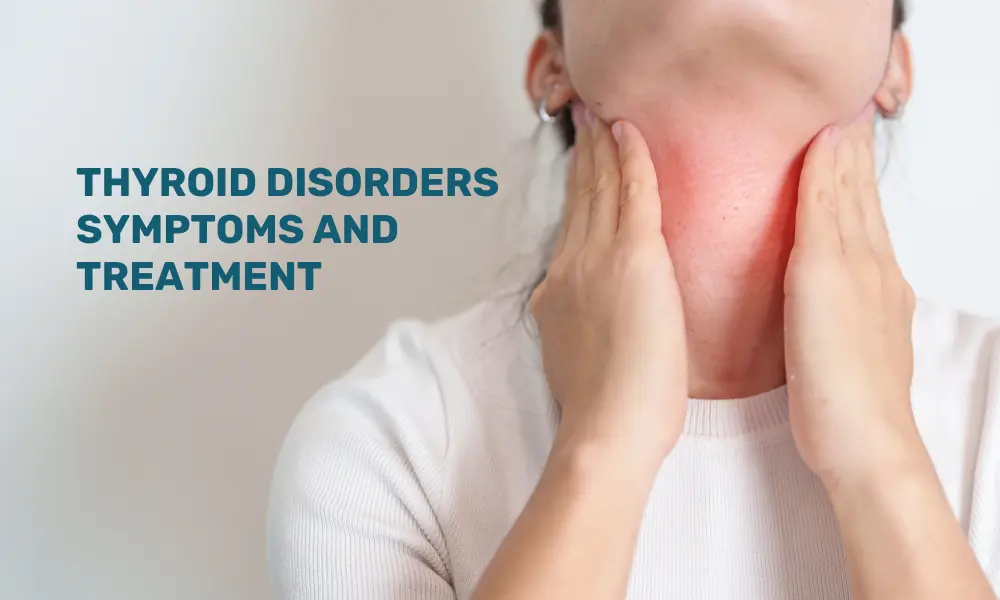The thyroid is a butterfly-shaped gland found at the base of the neck and is essential for general health since it regulates metabolism, energy levels, and numerous biological processes. Let us understand different disorders related to the thyroid and the treatment of thyroid disorders.
Common Thyroid Disorders
Thyroid problems include a variety of ailments, the two most common being hypothyroidism and hyperthyroidism. Hypothyroidism is a condition caused when the thyroid gland does not generate enough hormones, resulting in symptoms including weariness, weight gain, and cold sensitivity. Hyperthyroidism, on the other hand, is caused by an excess of thyroid hormones, resulting in symptoms such as weight loss, anxiety, and an elevated heart rate. Despite its small size, the thyroid has a profound impact on our well-being. However, disrupting its delicate balance can result in a variety of health problems.
Causes of Thyroid Disorders
Factors that may increase an individual’s chance of thyroid disorder may include:
-
Iodine deficiency
-
Medications or surgery
-
Radiation therapy
-
Autoimmune disease
-
Pregnancy
-
Excessive smoking
-
Unhealthy diet, chronic stress, or lack of exercise
What Are T3, T4, TSH Blood Tests?
The thyroid gland generates hormones that are necessary for several bodily functions. When it fails to operate effectively, it can cause several health problems, from simple concerns like weariness to more serious disorders like heart disease.
Blood tests are used in routine screening to determine thyroid hormone levels, namely thyroid-stimulating hormone (TSH), free thyroxine (T4), and free triiodothyronine (T3). These tests give vital insights into thyroid function and can detect issues before symptoms appear.
The Thyroid Stimulating Hormone (TSH) test determines if your thyroid is adequately functioning. It is the major diagnostic tool for thyroid diseases. Free T4 and T3 levels assess the active hormones accessible to the body’s organs and tissues, providing a more accurate picture of thyroid health.
Regular thyroid tests are especially important for anyone with a family history of thyroid disease, women over the age of 35, and those who have unexplained symptoms.
The Thyroid Antibody Test detects the presence of antibodies against thyroid tissue and can aid in the detection of autoimmune thyroid disorders such as Hashimoto’s thyroiditis or Graves’ disease. It is critical to determine if an autoimmune reaction causes your thyroid problems.
You should get a thyroid test if you are experiencing signs of thyroid dysfunction, such as sudden weight fluctuations, mood swings, irregular heartbeats, or changes in energy levels. This test may also be required due to a family history or specific medical issues.
Importance of early Detection of Thyroid
Routine screening enables early discovery of thyroid diseases, which is a game changer in their management. Early diagnosis enables healthcare practitioners to conduct measures that can halt the course of thyroid problems and reduce consequences. Furthermore, early identification is critical for pregnant women since thyroid dysfunction during pregnancy can impair fetal development and result in difficulties.
Genetics, autoimmune illnesses, iodine deficiency, and certain drugs are all potential causes of thyroid problems. Common autoimmune thyroid disorders include Hashimoto’s thyroiditis and Graves’ disease. Lifestyle, stress levels, and environmental factors can all contribute to thyroid dysfunction.
Understanding the reasons is critical for prevention and successful management. Early thyroid screening ensures timely diagnosis, enables effective management, prevents complications, and promotes overall health and well-being. To book a thyroid test – CLICK HERE.
FAQ on Thyroid Disorders
How do you reduce thyroid levels?
One may implement several lifestyle changes to maintain a healthy thyroid; these may include:
Stress Management
Healthy and active lifestyle
Proper Sleep
Maintain healthy body weight
Enough Iodine intake
Avoid smoking
What is the common treatment for thyroid disorder?
Common treatments for thyroid disorders include medications and sometimes surgery. The treatment depends on the type of thyroid disorder.
Can thyroid cause unwanted thoughts?
Yes, thyroid disorders can cause mental health symptoms, including unwanted thoughts, anxiety, and depression.





